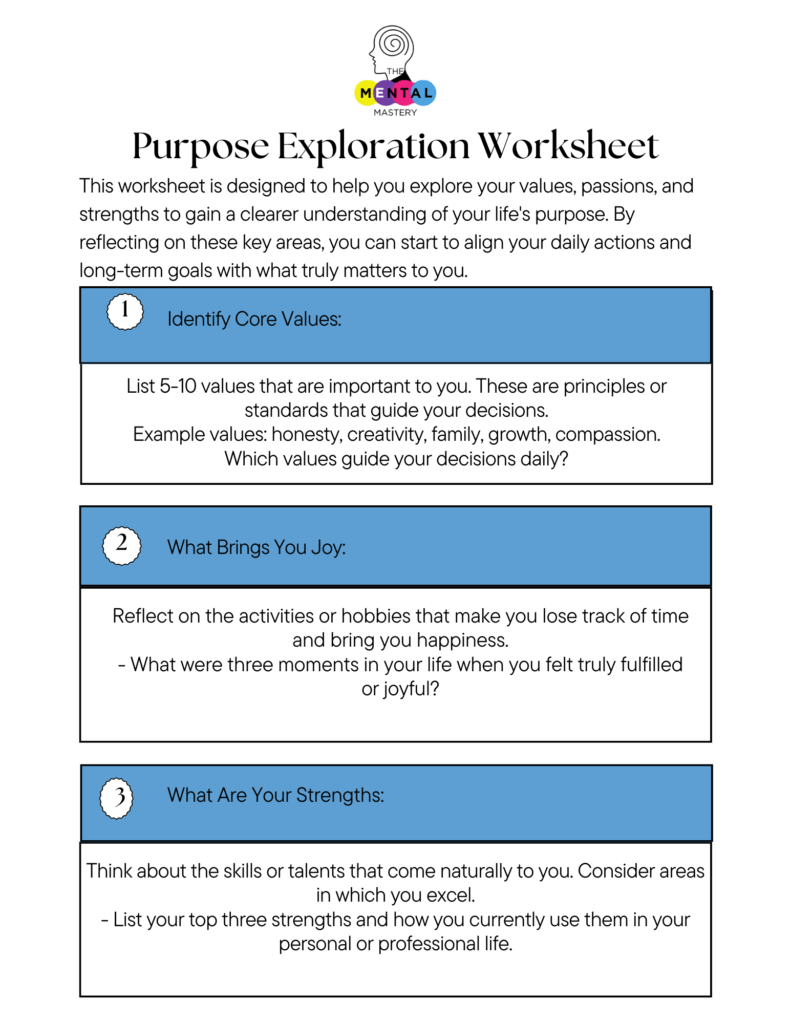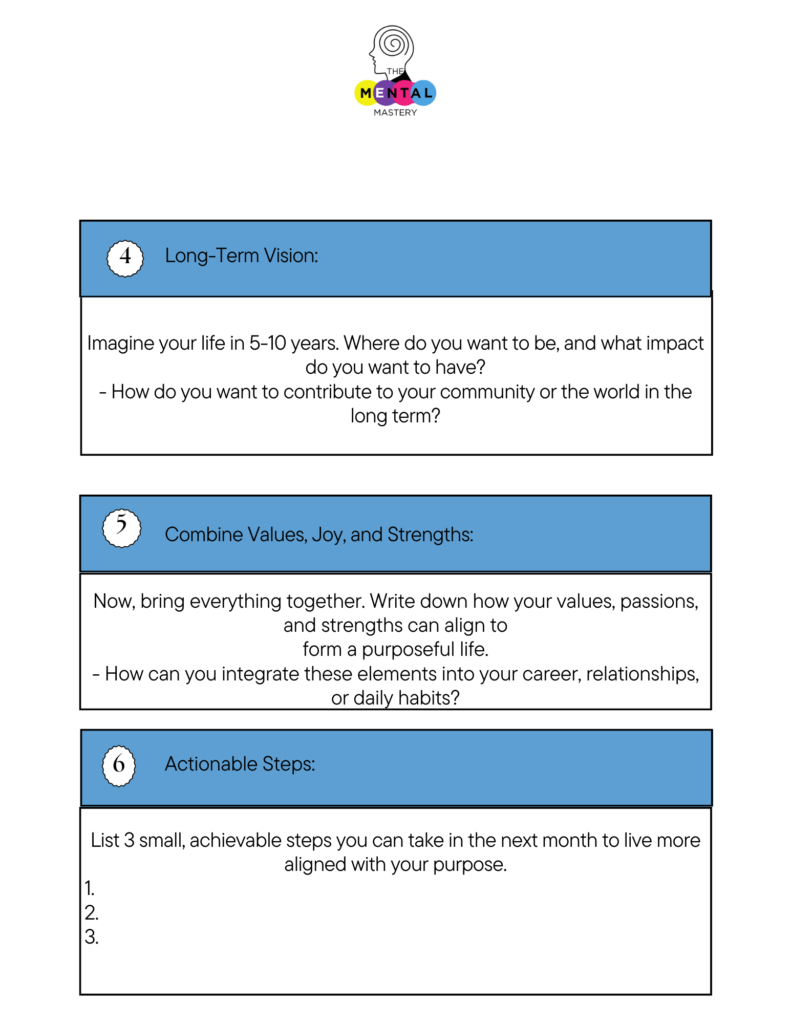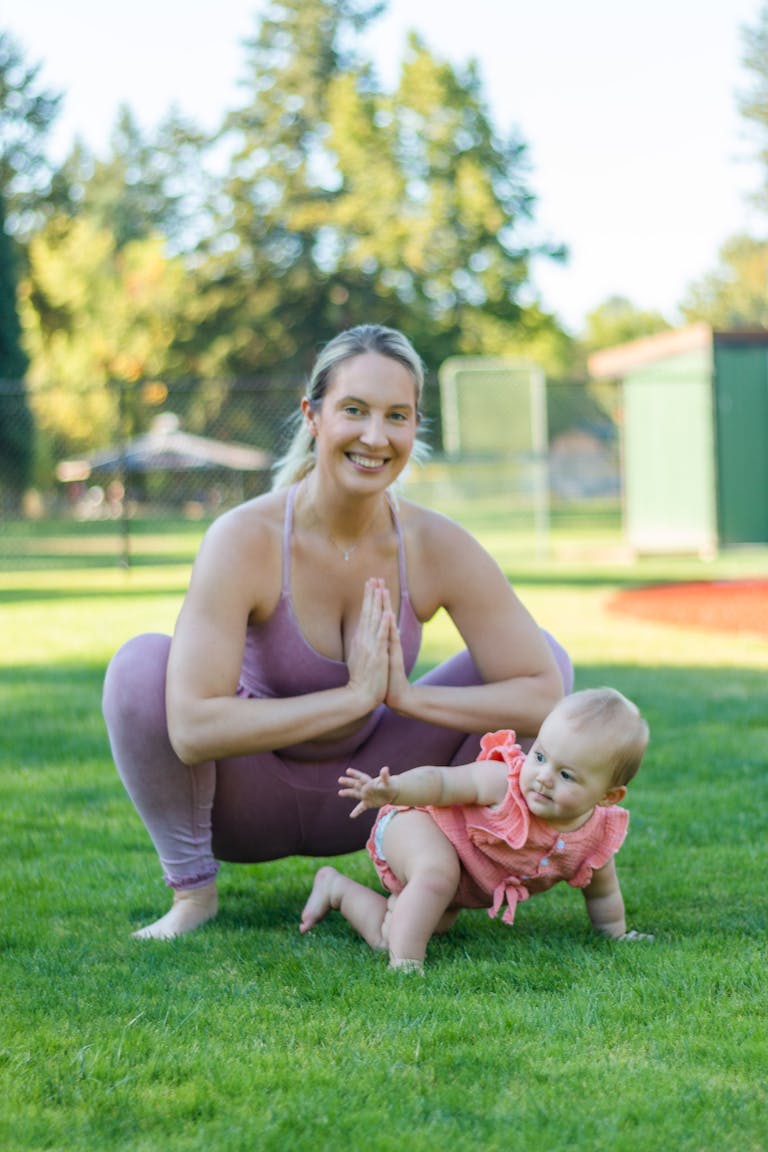Finding Purpose: The Key to Living a Meaningful Life (+ worksheet)
Introduction
In today’s fast-paced and often overwhelming world, many individuals are grappling with a deep question: What is my purpose? This query is not only central to leading a meaningful life but also directly linked to our overall mental health. Studies suggest that a sense of purpose can significantly improve well-being, reduce the risk of mental health challenges, and even increase longevity (Hill et al., 2016). In this article, we’ll explore how finding purpose contributes to mental health, practical steps to discover your unique purpose, and introduce a Purpose Exploration Worksheet to help you on this transformative journey.

Understanding Purpose and Its Link to Mental Health
Finding your life’s purpose can be defined as discovering what makes it meaningful. Psychological study indicates that people who have a clear sense of purpose feel more resilient, fulfilled, and satisfied (Steger, 2017). This is a scientifically based aim, not just an idealistic one. Research has repeatedly demonstrated that having a purpose lowers stress, anxiety, and depressive symptoms (McKnight & Kashdan, 2015). People with a strong sense of purpose tend to handle life’s challenges more effectively, as purpose provides a guiding light during difficult times.
Why Purpose Matters for Mental Health
One key reason purpose is so closely linked to mental health is because it creates a framework for decision-making. When we understand our “why,” we gain clarity on our daily actions. Purpose helps people cultivate a positive sense of identity, and this clarity directly impacts emotional stability. Furthermore, purpose-driven individuals often feel more connected to others, reducing the feeling of isolation, which is a known contributor to mental health challenges (Schnell, 2009).
5 Ways to Discover Your Life’s Purpose
1. Reflect on Core Values
Start by understanding what you truly value. Is it family, personal growth, creativity, or helping others? Reflect on the moments that have felt most meaningful in your life and identify the values that were at play during those times.
2. Consider Your Strengths and Passions
What activities make you feel alive? These passions and strengths can often point towards your purpose. Are you passionate about art, mentoring, or problem-solving? Aligning purpose with your natural strengths helps ensure it feels authentic.
3. Think About Legacy
What do you want to be remembered for? Thinking about how you want to impact the world can offer deep insight into your purpose. A legacy-driven mindset allows you to look beyond immediate gratification and focus on long-term fulfilment.
4. Evaluate Past Experiences
Often, our purpose is influenced by our personal stories. Have there been challenges or experiences in your life that shaped who you are? These experiences can offer clues about where your purpose lies.
5. Engage in Self-Reflection
Set aside time to meditate or journal on purpose. The more you reflect on what gives your life meaning, the clearer your purpose will become.
Using the Purpose Exploration Worksheet
To aid you in discovering your purpose, we’ve created a Purpose Exploration Worksheet that walks you through exercises designed to help you clarify your goals, values, and the impact you want to have on the world. The worksheet includes sections for reflecting on core values, identifying strengths and passions, and writing down long-term aspirations.


The worksheet is a practical tool you can use to write down your thoughts and track your progress over time. Each section is crafted to deepen your understanding of yourself and guide you toward articulating your purpose.
Overcoming Common Barriers to Purpose
Discovering your purpose can feel overwhelming. Many individuals are hindered by self-doubt, fear of failure, or the misconception that purpose must be grandiose. However, research suggests that purpose doesn’t need to be tied to a career or specific achievement. Instead, it can be found in small, daily actions that align with your values (Baumeister, 2016). The key is to remain patient with yourself and acknowledge that purpose is an evolving journey, not a fixed destination.
If you feel stuck, it’s important to seek support. Therapists and counsellors trained in existential and positive psychology can help individuals explore their purpose in a safe, supportive setting. Don’t hesitate to ask for guidance if you’re unsure of your next step.
Applying Purpose in Daily Life
Once you’ve identified a purpose, the next step is integrating it into daily life. Purpose shouldn’t be confined to big, life-altering decisions. It should guide everyday actions. Whether it’s your relationships, work, or leisure, having a purpose ensures that your actions are meaningful. People who regularly align their daily habits with their purpose experience a greater sense of satisfaction and emotional resilience (Schippers et al., 2020).
A practical way to maintain this alignment is by revisiting your purpose statement regularly. The Purpose Exploration Worksheet encourages you to create a purpose statement, which you can refer to when making decisions or when life becomes challenging. Having this clarity acts as a compass, ensuring that you stay true to your values.
Understanding the Topic
The concept of purpose is more than just a philosophical idea. It’s backed by solid psychological research showing its importance to mental health and life satisfaction. Psychologists agree that those who live with purpose are better equipped to handle stress, anxiety, and the inevitable ups and downs of life. In understanding this, you can embark on a more meaningful journey toward a life that truly resonates with your deeper self.
Conclusion
Living a meaningful life isn’t about achieving perfection or chasing happiness. It’s about finding purpose, which provides a sense of direction and fulfilment. The journey to discovering your purpose is deeply personal, but tools like the Purpose Exploration Worksheet can offer guidance along the way. Start reflecting on your core values, strengths, and passions today, and remember—living with purpose is one of the most powerful ways to improve your mental health and overall quality of life.
References
Baumeister, R. F. (2016). The need to belong: Desire for interpersonal attachments as a fundamental human motivation. Psychological Bulletin, 117, 497-529.
Hill, P. L., Turiano, N. A., Mroczek, D. K., & Roberts, B. W. (2016). Purpose in life as a predictor of mortality across adulthood. Psychological Science, 26(11), 1782–1790. https://doi.org/10.1177/0956797615606683
McKnight, P. E., & Kashdan, T. B. (2015). Purpose in life as a system that creates and sustains health and well-being: An integrative, testable theory. Review of General Psychology, 13(3), 242–251. https://doi.org/10.1037/a0017152
Schippers, M. C., & Ziegler, N. (2020). Life crafting as a way to find purpose and meaning in life. Frontiers in Psychology, 11, 3182. https://doi.org/10.3389/fpsyg.2020.579101
Schnell, T. (2009). The Sources of Meaning and Meaning in Life Questionnaire (SoMe): Relations to demographics and well-being. The Journal of Positive Psychology, 4(6), 483–499. https://doi.org/10.1080/17439760903271074
Steger, M. F. (2017). Meaning in life and well-being: The mediating role of self-reported meaning. Journal of Personality, 85(4), 530-541. https://doi.org/10.1111/jopy.12315







